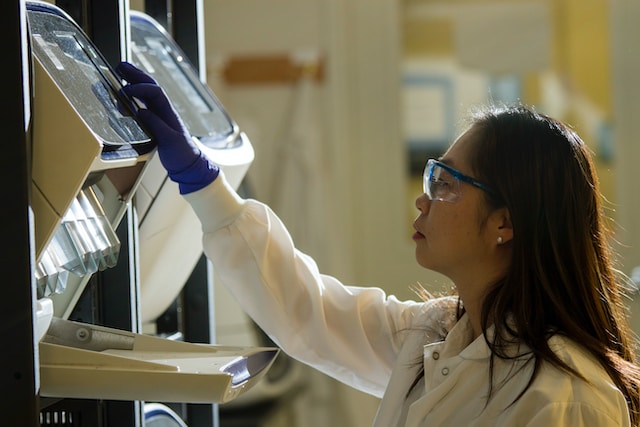The American Association for Cancer Research (AACR) hosted its 114th annual meeting in Florida in April. Scientists, medical professionals, and many others came together to discuss the latest cancer research.
This year’s theme was “Advancing the Frontiers of Cancer Science and Medicine.” Many Biotechnology Innovation Organization (BIO) members also shared new, relatable insights at the meeting.
Below is a roundup of some of the biggest cancer developments.
1. BeiGene
BeiGene is conducting expansionary research with other biotech and biopharmaceutical entities like MapKure and SpringWorks Therapeutics, Inc. MapKure, BeiGene, and SpringWorks are collectively working on the development of a new, selective RAF dimer inhibitor, BGB-3245, to treat advanced or refractory solid tumors like melanomas. Phase 1a/1b of the trial saw great success in patients, with promising antitumor activity and manageable side effects.
Additionally, BeiGene and SpringWorks are developing a treatment for solid tumors that are progressed or resistant with RAS/ RAF mutations and other MAPK pathway abnormalities. This includes combining BeiGene’s RAF dimer inhibitor, lifirafenib, and SpringWork’s MEK inhibitor, mirdametinib, which has already demonstrated positive antitumor activity in Phase 1b of the trial.
CEO of SpringWorks, Saqib Islam, reflected on the partnership saying, “We view vertical inhibition approaches as a promising strategy to improve outcomes in biomarker-defined subgroups of patients that lack efficacious treatments for their cancers.”
2. Genentech
Genentech conducts great research to better improve cancer outcomes for liver disease patients, emphasizing the urgent need for adjuvant treatments. Their prescription medicine Tecentriq (atezolizumab) and Avastin (bevacizumab) have shown reductions in recurring cancer for patients diagnosed with adjuvant liver cancer, specifically hepatocellular carcinoma (or HCC).
There has been an ongoing Phase III clinical trial (titled IMbrave 050) that researches the effectiveness of using a combination of atezolizumab and bevacizumab to treat HCC. New data from the trial shows the Tecentriq plus Avastin mix produced a 28% reduced risk for the return of the cancer. “Four out of five people with HCC who receive surgery with curative intent may still see their cancer return,” says Levi Garraway, Head of Product Development and Chief Medical Officer at Genentech.
3. Moderna and Merck
Results from a promising trial for the treatment of high-risk melanoma were released by Moderna and Merck. The trial examined the interactions between Moderna’s mRNA-4157 (V940), an investigational individualized neoantigen therapy, and KEYTRUDA, Merck’s anti-PD-1 medication, for the treatment of stage III/IV melanoma. Results showed that mRNA-4157 (V940) in combination with KEYTRUDA, “demonstrated a statistically significant and clinically meaningful improvement in recurrence-free survival (RFS), and reduced the risk of recurrence or death by 44%,” when compared to treating with KEYTRUDA alone.
Moderna’s CEO Stéphane Bancel has also previously emphasized the potential in studying mRNA to create better individualized care for cancer patients, especially after its role in the COVID-19 pandemic.
4. OncoNano
OncoNano Medicine presented encouraging preclinical findings for their primary treatment candidate ONM-501.
A viable option for clinical testing, ONM-501 is a dual-activating STING agonist created with OMNI™ polymer technology. It exhibits substantial anti-tumor effectiveness in a number of preclinical mice models with no systemic toxicity.
Using ON-BOARD™ tumor-specific delivery technology, OncoNano Medicine also revealed encouraging results for an encapsulated bispecific antibody and cytokine. Due to tumor-specific distribution, this provides a way around the clinical application restrictions of extremely powerful protein therapies and opens up a considerably wider therapeutic window.
5. MAIA Biotechnology
MAIA Biotechnology is looking into how THIO, an agent that targets telomeres, can be utilized to treat patients with advanced Non-Small Cell Lung Cancer (NSCLC) with telomerase-positive cancer cells specifically.
Titled THIO-101, their Phase 2 clinical trial has two main objectives. First, to assess THIO’s performance in acting as an anticancer and priming immune system agent. Second, to analyze THIO’s efficacy using an Overall Response Rate (ORR) as the clinical endpoint.
The long-term ambition of the trial would be to improve patients’ sensitivity to the PD-1 protein (used to fight cancer cells) through an active, well-performing immune system.




